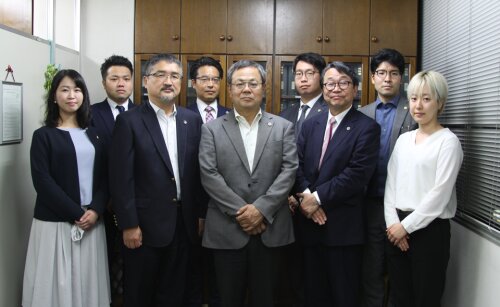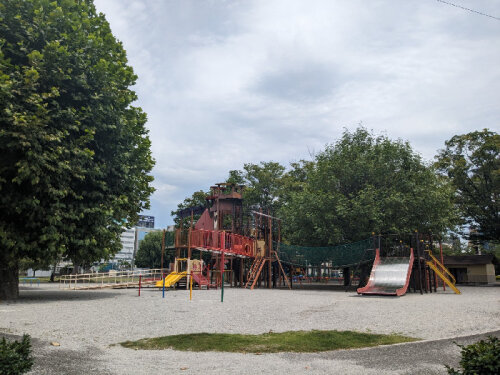Best Collaborative Law Lawyers in Shizuoka
Share your needs with us, get contacted by law firms.
Free. Takes 2 min.
Free Guide to Hiring a Family Lawyer
List of the best lawyers in Shizuoka, Japan
About Collaborative Law in Shizuoka, Japan
Collaborative Law is a voluntary, out-of-court process designed to help people resolve family disputes by negotiation with the assistance of specially trained lawyers and, where appropriate, other neutral professionals. In Shizuoka, as elsewhere in Japan, Collaborative Law is most commonly used for divorce, child custody and visitation, child support, and property division. The central idea is to reach a mutually acceptable agreement through cooperative problem solving instead of adversarial litigation. Participants and their lawyers sign an agreement committing to negotiate in good faith and to avoid court proceedings while the collaborative process is active.
Why You May Need a Lawyer
Even though Collaborative Law emphasizes cooperative negotiation, there are many reasons to have a lawyer who understands the collaborative process and local legal rules. Common situations where people may require legal help include:
- Divorce where both parties want a negotiated settlement but need legal guidance on rights and entitlements.
- Child custody and visitation disputes that require careful planning for the child s welfare and future arrangements.
- Complex asset portfolios, business interests, pensions or debt that need legal and financial analysis for equitable division.
- International elements, such as foreign assets or spouses with different nationalities, where legal implications cross borders.
- Cases involving potential enforcement issues, where an agreement should be drafted to be effective and enforceable under Japanese law.
- Situations where one or both parties want to avoid the stress, cost and publicity of court, but still want binding protections and clear documentation.
Local Laws Overview
Understanding the local legal framework in Shizuoka helps participants in Collaborative Law make informed decisions. Key aspects include:
- Civil Code and family law basics - Japanese Civil Code governs marriage, divorce, parental authority and property rights. Divorce can be by mutual agreement, mediation at the family court, or litigation.
- Divorce procedures - Many couples in Japan finalize divorce by mutual agreement and registering the divorce at the local municipal office. If agreement is not possible, family court mediation or court litigation may follow.
- Child custody and parental authority - After divorce, Japanese practice typically results in sole parental authority being awarded to one parent. Joint custody after divorce is not the standard legal outcome, so Collaborative Law agreements should take this into account when planning parenting time and decision-making.
- Child support - Child support obligations are based on statutory principles and guidelines. Agreements reached collaboratively should reflect fair calculations and be written clearly to aid enforceability.
- Property division - Marital property accumulated during marriage is subject to division. The collaborative process will consider contributions, debts and the practical needs of both parties when proposing a fair split.
- Protection from domestic violence - Japan has provisions to protect victims of domestic violence, including orders to prohibit abuse and to remove an abuser from a shared home. Collaborative processes must prioritize safety and may not be appropriate where safety cannot be assured.
- International matters - Japan is a party to international instruments relevant to child abduction and cross-border family issues. International situations can complicate negotiation, and specialist advice is often required.
Frequently Asked Questions
What is Collaborative Law and how does it work?
Collaborative Law is a negotiated settlement process in which each party is represented by a lawyer trained in collaborative practice. The parties and their lawyers sign an agreement to work together to resolve issues without going to court. The process typically includes joint meetings, information sharing, and the use of neutral professionals such as financial specialists or child specialists when needed.
How is Collaborative Law different from mediation or litigation?
Collaborative Law differs from mediation because each party has their own lawyer who participates in the negotiation; mediators are neutral third parties who facilitate discussion but do not represent either party. Litigation is adversarial and decided by a judge, while Collaborative Law focuses on cooperative problem solving and reaching a private agreement. Unlike mediation, collaborative lawyers usually agree to withdraw if the case goes to court, reinforcing the commitment to settle outside court.
Is an agreement reached in Collaborative Law legally binding?
An agreement reached collaboratively becomes legally binding when it is reduced to a written contract and signed by the parties. For divorce, a mutual agreement must be registered at the municipal office to take effect. It is important to have legal review of the agreement to ensure it addresses enforceability and any necessary formalities under Japanese law.
Can Collaborative Law be used for divorce, child custody, and property division?
Yes. Collaborative Law is commonly used to address divorce, parental authority and custody arrangements, visitation schedules, child support, and division of marital property and debts. The process can be adapted to the specific needs of the family and to include other professionals for financial or child-related issues.
What happens if the Collaborative process fails and one party decides to go to court?
In typical collaborative practice, the lawyers who participated in the collaborative process withdraw if either party chooses to pursue court proceedings. This rule encourages sincere settlement efforts but also means both parties will need new counsel for litigation. Confirm with your collaborative agreement how breakdowns are handled in your situation.
How much does Collaborative Law cost in Shizuoka?
Costs vary based on the complexity of the case, the number of meetings, and the involvement of neutral experts. Collaborative Law can be less costly than prolonged litigation, but it usually involves hourly legal fees and fees for any neutral professionals. Ask for a clear fee estimate and billing method during the initial consultation with a prospective collaborative lawyer.
How long does a Collaborative Law process usually take?
There is no fixed timeline. Some cases are resolved in a few meetings over a couple of months, while more complex matters may take longer. The timeline depends on the parties willingness to negotiate, the complexity of finances and parenting issues, and the availability of neutral professionals.
Is Collaborative Law appropriate in cases involving domestic violence?
Collaborative Law may not be appropriate where there is ongoing domestic violence, coercion or significant power imbalances that prevent free negotiation. Safety must be the priority. If there has been violence or a credible threat, seek immediate advice from a lawyer or local support services about protection measures before considering negotiation-based processes.
Can Collaborative Law handle international or cross-border issues, such as international child custody or assets abroad?
Collaborative Law can address international elements, but these matters add legal complexity. Issues such as foreign assets, immigration or visa status, and international child custody raise questions about enforceability and applicable law. If your case has cross-border elements, consult a collaborative lawyer with international family law experience or other specialists to ensure arrangements are viable in all relevant jurisdictions.
How do I find a qualified Collaborative Law lawyer in Shizuoka?
Start by contacting the local bar association or legal consultation centers to ask for family law or collaborative law referrals. Look for lawyers who mention collaborative practice training or experience in family negotiation. During initial consultations, ask about the lawyer s collaborative experience, typical process, fee structure, and whether they work with neutral professionals for financial or child-specialist issues.
Additional Resources
For support and more detailed information, consider these local and national resources:
- Local bar association - for referrals to qualified family law and collaborative practitioners in Shizuoka.
- Family court with jurisdiction over Shizuoka - for information on mediation, custody and court procedures if collaborative negotiations are not successful.
- Japan Legal Support Center - for publicly funded legal consultation and information on available services.
- Municipal family support centers and child welfare services in Shizuoka - for practical assistance related to childcare and child welfare concerns.
- Domestic violence support services and counseling centers - for safety planning and immediate protection if needed.
Next Steps
If you are considering Collaborative Law in Shizuoka, these practical steps will help you move forward:
- Gather documents - collect financial records, bank statements, pension information, property deeds, and documents related to children including school and medical records.
- Seek an initial consultation - contact a family lawyer who practices collaborative law to discuss your situation and evaluate whether collaborative practice suits your needs.
- Ask about experience and fees - request details on the lawyer s collaborative experience, the expected process, estimated timeline and a clear fee estimate.
- Consider neutral professionals - if finances or children s needs are complex, discuss involving a neutral financial specialist or child specialist to assist negotiations.
- Sign a participation agreement - if you and your lawyer choose the collaborative route, the parties typically sign a participation agreement that outlines the process, confidentiality and the commitment not to go to court during the collaborative process.
- Stay focused on the children and practical outcomes - collaborative negotiations often produce more tailored and practical arrangements than court rulings, but they require good faith participation and realistic expectations.
Disclaimer - This guide is for general informational purposes and does not constitute legal advice. Laws and procedures can change and local practice may vary. For advice tailored to your situation, consult a licensed lawyer in Shizuoka experienced in Collaborative Law and family law matters.
Lawzana helps you find the best lawyers and law firms in Shizuoka through a curated and pre-screened list of qualified legal professionals. Our platform offers rankings and detailed profiles of attorneys and law firms, allowing you to compare based on practice areas, including Collaborative Law, experience, and client feedback.
Each profile includes a description of the firm's areas of practice, client reviews, team members and partners, year of establishment, spoken languages, office locations, contact information, social media presence, and any published articles or resources. Most firms on our platform speak English and are experienced in both local and international legal matters.
Get a quote from top-rated law firms in Shizuoka, Japan — quickly, securely, and without unnecessary hassle.
Disclaimer:
The information provided on this page is for general informational purposes only and does not constitute legal advice. While we strive to ensure the accuracy and relevance of the content, legal information may change over time, and interpretations of the law can vary. You should always consult with a qualified legal professional for advice specific to your situation.
We disclaim all liability for actions taken or not taken based on the content of this page. If you believe any information is incorrect or outdated, please contact us, and we will review and update it where appropriate.









